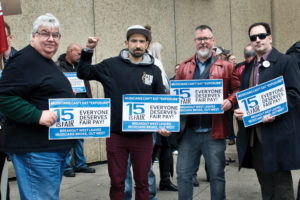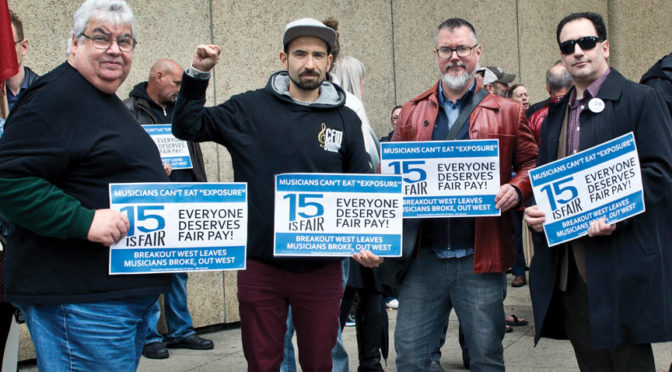At the time of this writing, I have just stepped off a plane from Edmonton, Alberta, having spent the last few days organizing a demonstration/rally, juggling interviews with the press and radio reporters, and meeting with a politician of the ruling provincial New Democratic Party (NDP). At the core of it all was the ongoing effort to get an agreement with the Western Canadian Music Alliance (WCMA), the entity that operates the BreakOut West music festival (BOW).
As I have reported before, the WCMA have an operating budget of roughly $600,000, with a substantial amount of that derived from various government grants and funding, along with private sponsorship. While they have no choice but to pay the “headline” acts fairly, as they have the effect of validating the festival, the lion’s share of the musicians are not paid. Previous agreements with the festival did provide for payment, but BOW has changed their “business model” in favour of belittling musicians even further.

More than 50 musicians and supporters picketed the BreakOut West (BOW) festival’s host hotel. BOW has refused to negotiate a contract to pay musicians.
This type of social injustice is not just a problem for musicians, but for all Canadian workers, and that premise was why we approached the Alberta Federation of Labour (AFL) for their assistance. They were eager to help, as our message was a perfect fit for “$15 And Fairness,” a nationwide campaign of the Canadian Labour Congress (CLC). The AFL folks were instrumental in producing themed signs and handouts, issuing an “Action Alert” to their affiliates and media to announce the day and time of the rally, and then bringing their staff to participate.
Special thanks must be given to the Edmonton Symphony Orchestra, who sacrificed their break time to help bolster our numbers to more than 50—plenty of folks to fill the street in front of BOW’s host hotel. In addition, in a stunning show of solidarity, we were joined by international jazz great P. J. Perry and blues artist Graham Guest of Local 390 (Edmonton, AB). With chants of “Pay the band, not the man,” our group was successful in sending a strong message.

(L to R) At the BOW Rally are AFM Vice President from Canada Alan Willaert, Supervisor Electronic Media Services Canada Daniel Calabrese, Director of Organizing & Education Michael Manley, and Negotiator Todd Jelen.
I would also like to thank the AFM Director of Organizing Michael Manley, along with Negotiator Todd Jelen, and Supervisor Electronic Media Services Canada Dan Calabrese, who rounded out the AFM’s onsite personnel. In addition, a special thank you to Local 390 President E. Eddy Bayens and Secretary Edith Stacey for their assistance and outreach to members, and to Local 547 Secretary-Treasurer Doug Kuss, who took the day to travel and support our event.
Following the rally, Bayens and I met with a member of parliament to impress upon him the government’s error in not being more careful about what they were providing grants for. Since the NDP are currently in power in Alberta, one would have to believe that more serious consideration will be forthcoming, as it was pointed out that musicians were paid nothing, not even minimum wage, as required by law.
The demonstration and show of solidarity is only the beginning of this story; pressure must now be brought to bear upon all sponsors of the festival, to ensure that next year’s event is either under a CFM agreement or doesn’t happen. Members, please take note that the WCMA continues to be on the International Unfair List. No contracts should be entered into with them or their affiliates for any performances, until further notice.







